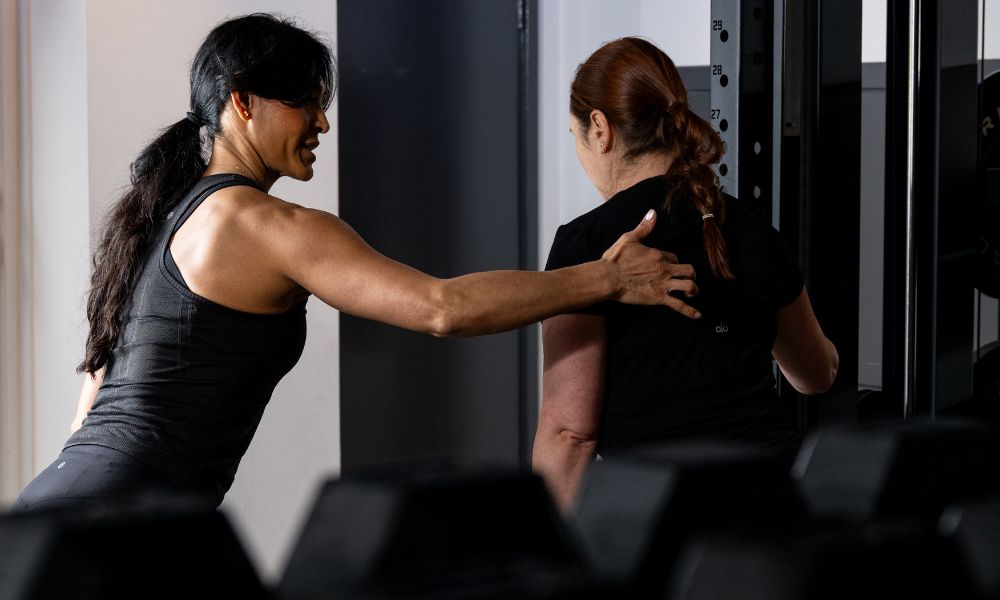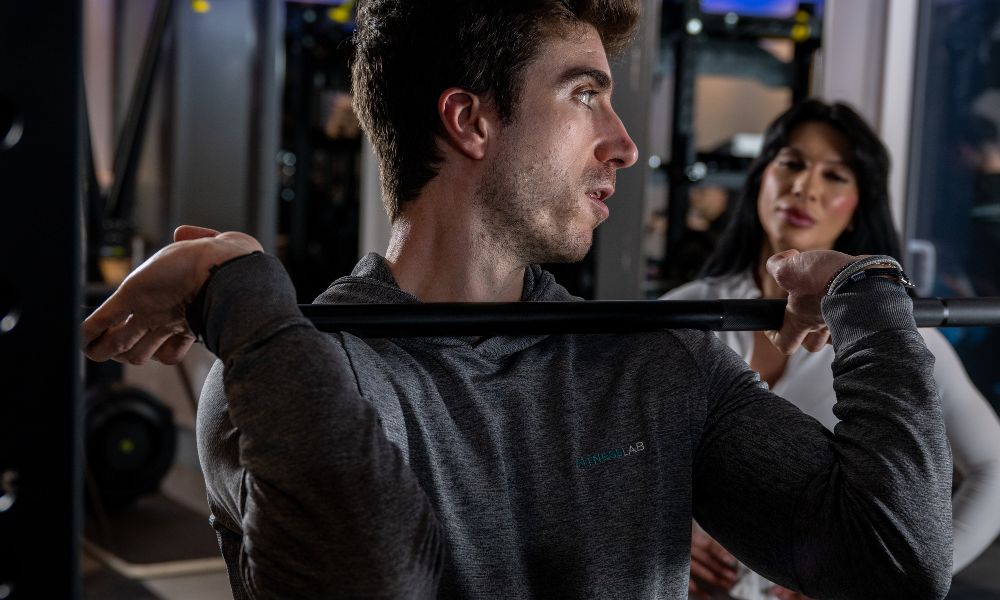When it comes to the specifics of exercise, whether that’s the movements, the frequency, or the lifestyle factors surrounding it, the internet is awash with advice. The trouble is, none of that advice is based around you, and, worse still, much of it is created simply to drive engagement, which can lead to questions surrounding the quality of the information.
In this blog, we’ll aim to take a more sensible and informed stance – explaining how you can enact a workout plan that’s right for you when it comes to longevity – and how to make sure you see the physical and mental health benefits you’re hoping for in the longer term.
How Many Personal Training Sessions For Longevity?
In terms of how many sessions you might want to book to start seeing longevity benefits, the answer really depends on your lifestyle. If you’re someone who does very little physical activity at the moment and you’re pushed for time each week, starting with one session a week is a huge improvement.
Then again, if time’s a little more on your side and you’ve got a moderately active lifestyle, adding two or three sessions to your week might be the best way for you to go.
The key factors here to be thinking about are consistency and steady progression. Would you benefit from a complete overhaul of your diet, sleep patterns, and exercise regime? Probably. But, will upending your life and trying to fit hours upon hours of new factors in stuck? Unlikely.

The correct answer is; whatever fits into your life right now with minimal disruption. Typically, people find that exercise works as a sure-thing investment, with the dividends being greater focus, improved energy levels, increased productivity, and a better mood. When you start seeing those benefits, you’ll typically find time starts to free itself up, which means you can naturally reinvest time in more sessions, compounding the benefits as you do.
Short answer? What can you fit into next week without it feeling like a burden? The answer to that question is the number of sessions that’s right for you. If the answer feels like “zero”, – we’d encourage you to try one and see how those benefits roll into your week immediately; you’ll almost certainly be surprised.
How Much Resistance Training vs Other Exercise?
Look at any health longevity research, and you’ll see people extolling the benefits of strength training exercises. They’re definitely not wrong – there are countless studies that explain the benefits of strength training on reducing cardiovascular disease mortality rates, improving muscle mass, re-establishing bone density, optimising brain health, improving mental clarity, regulating hormone production, lowering blood pressure, and many more issues that become increasingly important as we age.
The thing is, strength training is extremely time-efficient. A figure of 10 hours of physical activity a week is often touted when it comes to improving longevity – but only a fraction of that needs to be spent moving weights.
If time allows it, adding 2-3 hour-long sessions of strength training to your week is fantastic for longevity goals, especially if you can top that up with light to moderate intensity exercise elsewhere (think walking, running, cycling, swimming, squash, tennis, etc). That said, if your time is at a premium – which for so many people it is – one weights session weekly and even 30 minutes of low to moderate physical activity a day is a huge step in the right direction.
As we’ve already touched on, a manageable amount of exercise in your week is infinitely better than a few intense weeks that you give up on after a month. Adding to an existing time-efficient health regime in the coming weeks or months is the very best way to grow a habit.
Training and Habits: How the Two Work Together For Longevity
If you’ve tried a version of personal training before, or you’ve just got an idea of what might be involved, you could be fooled into thinking your coach is only going to be interested in what you’re doing in the studio – but, when you work with an outstanding training company, this couldn’t be further from the truth.
Since resistance training is just one part of working towards better long-term health, it’s extremely useful to have someone to advise and support you with the other factors that are important – and that’s what a world-class personal trainer is there for.

It’s useful to think of the things that help with health longevity as being in two different categories – training and habits. In the gym, we’ll guide and support you with the training – but we also take on the role of trusted advisors when it comes to broader life habits too.
In addition to physical activity, nutrition and sleep are the other two big factors to think about if you’re aiming for a longer, healthier life. Both these subjects feature as the topic of countless books, ever-evolving research papers, and endless layperson opinions, all of which make it difficult to get to the facts as they apply to you. Having a PT apply this knowledge to you and your life isn’t dissimilar to partnering with a world-class accountant, architect, or trusted personal assistant – the theory is easy to find, but the right professionals will help you apply that theory in the way that benefits you and your situation.
How Often Should You Train? Best Practice: Outsource the Answer
We live in a world where people place an unnecessary amount of importance on toiling to earn good health – yet no one expects one person to deal with the daily running of five business divisions while building their own home and home-educating their children into their twenties. Instead, we outsource that work to exceptional, trustworthy people – and the results are better for it.
If you do want to roll up your sleeves and work on longevity yourself, These are some broad, guideline answers:
- Work your way up to exercising for 10 hours a week, with around 2-3 hours of that being progressive resistance training and the rest focusing on cardiovascular health and mobility.
- Aim for a diet based on whole foods that has the right balance of protein, carbohydrates, fats and fibre – while moderating your refined sugar intake.
- Try for 7-8 hours of sleep a night with a strong focus on sleep hygiene habits.
These aren’t bad answers by any means – but they are generic. The alternative to these answers is to work with a world-class personal training service. If you do, you’ll get a number of sessions that works for you, personalised nutrition advice that’s easy to follow and stick to, sleep and rest advice that considers your lifestyle, and countless other tips that are based on you as an individual.
Of course, psychology plays a part too. If you’re relentlessly internally motivated, then sticking to your own plans is going to be easier for you – but for the 99% of the rest of us, having the accountability and encouragement of a trainer is a priceless addition to the longevity health picture too.
Whichever you choose, you’ve got an eye on living a longer, healthier life, which is always a good thing – you just have to decide on the most effective way of executing a lasting plan.

